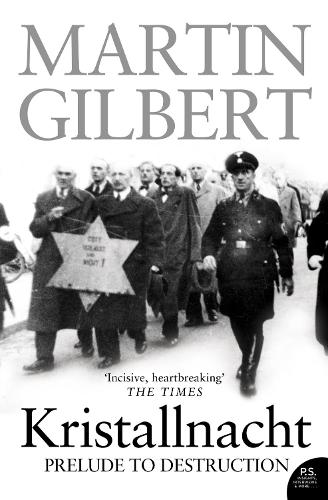
Kristallnacht: Prelude to Destruction
(Paperback)
Publishing Details
Kristallnacht: Prelude to Destruction
By (Author) Martin Gilbert
Series edited by Lisa Jardine
Series edited by Amanda Foreman
HarperCollins Publishers
HarperPerennial
16th October 2007
United Kingdom
Classifications
General
Non Fiction
Second World War
Modern warfare
940.53
Physical Properties
Paperback
336
Width 129mm, Height 198mm, Spine 20mm
230g
Description
One of our most eminent historians presents a powerful look at the buildup to and aftermath of one of the most decisive moments of World War II Kristallnacht not only for the Jewish population suddenly identified as a group to be destroyed, but also in terms of the international response it inspired and its larger implications.
In Kristallnacht, Martin Gilbert seamlessly combines a moving account of the suffering of the victims of the Nazi regime with a sophisticated analysis of the gradual process which made the horrors of the Third Reich possible. Broadening his canvas, Gilbert also powerfully depicts how the rest of the world failed Europes increasingly desperate Jewish population: in the aftermath to Kristallnacht almost every country was asked to help; most would not do so, despite the transport of a staggering 10,000 German Jewish children to Britain. This international indifference had direct implications for future German policy, while the events of Kristallnacht went on to radically influence the attitudes of governments and people outside Germany towards Nazism.
Reviews
Praise for 'Kristallnacht': 'An incisive, heartbreaking account.' The Times 'Horribly vivid!a book that makes the horror strikingly fresh.' Observer 'Gilbert's meticulous documenting of the slope from discrimination to Kristallnacht to the Holocaust.' Financial Times Praise for 'Empires of Conflict': 'Martin Gilbert is the most prodigious author of our time!He is a phenomenon who arouses envy among less productive professional historians!He has a fine eye for a telling passage and a memorable detail.' John Ramsden, Financial Times
Author Bio
Martin Gilbert was born in London in 1936 and educated at Highgate School and Magdalen College, Oxford. In 1962, he became research assistant to Randolph Churchill and, after Randolphs death, succeeded him as biographer of Sir Winston Churchill. He is the author of many works of history and lives in London and Jerusalem.
